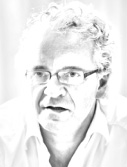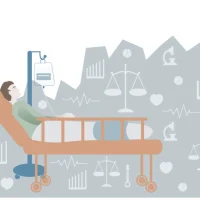HealthManagement, Volume 17 - Issue 2, 2017
Alternative financing at hospital level can make a difference.

In an environment of budget cuts and increasing pressure on healthcare services how does your hospital cope?
In Belgium, and also I think globally, governments and other payers will not be able to keep up with expensive needs, such as an ageing population, personalised medicine, new anti-cancer drugs etc. There are various possible answers. You can ask for more money, but this is not our approach because there isn’t any. So there are three levels where you have to intervene. The first is the macro level—the health system, and you have to play by the rules of that system, which is a national health insurance system in Belgium. Second is th e m eso level, th e h ospital level. There we can make a difference. Around six years ago, we started a programme of alternative financing. We look for money outside the typical channels of hospital funding, and it stands on three pillars. First, we started a programme in international patient care and internationalisation at large. Secondly, we began a programme to increase the valorisation of our intellectual property, such as establishing spin-off companies. We have a very powerful and sophisticated Electronic Patient Record, which we are valorising in our country now. The third pillar is professionalisation of the fundraising programme. This gives us some ‘oxygen’ and extra income to cope with the meso level. The micro level is the doctor-patient relationship and care in itself. We can find many more efficiencies in our healthcare delivery system. Within our hospital we allow for various managerial tactics to reach our care goal. We have some departments, which we treat as if they were small or medium enterprises. We have departments in which we allow decentralised self-steering governance. We have other departments where we have tried to materialise clinical pathways so that form follows function. Finally, we have other departments where we allow self-organisation in holacratic systems. A variety of measures, not a single answer, will solve all the financial questions. It's a multiple approach.
A few years ago we issued a financial action plan in the hospital. We invited all the medical and nonmedical departments to establish an action plan to achieve 3% improvement in margin within three years. They had total liberty to work on costs or income, or preferably both. At the end of three years, we expected a 3% margin increase. In Belgium a hospital has an average margin of between 0.5 and 1%, which is very low. Every year the government cuts away this margin, so we wanted to have some kind of reserve. This was a hospital-wide initiative with a lot of departmental freedom. There were departments that were really focused on cutting costs, whereas others were more focused on intelligent growth and revenue, and many focused on both. If you have a really concrete plan in your hands, with a business case behind it, you can make your investment decisions. Staff had to think really hard to propose things and always in the context of an increase in margin. The main drivers were “revenue before cost” and “better before cheaper”.
Would population health measures, such as fighting the obesity epidemic, play a role in helping to contain healthcare expenditure?
Obesity is a public health issue on the macro level, and as a hospital, we play no active role. This is one of my criticisms of our current system: we talk about healthcare but actually we are doing ‘sick care’, and we are talking very little about healthcare and public health. For instance, in Belgium probably only 2% of the total budget is spent on prevention and 98% is spent on cure, which is kind of a strange business model. And 80% of what we spend, we spend during the last six months of life. I would much prefer a paradigm shift, to change to a healthcare system and not to a sickcare system, but this is politics and it's not my job!
The ageing population is already
putting pressure on finances, and that will increase.What is your vision
for running a hospital in a cost-efficient manner?
The major challenge for the future will be human resources, to find people. If you look at the numbers in 2045—that's a year of interest to me because then I will be 85—there will be 600,000 people aged 85+ in Belgium, compared to 120,000 or so now. There will be a huge population of very old people with probably a number of chronic diseases, and at the same time in our country a decrease in the number of active people. Nowadays there are four active people for one retired person, and that will change to 2.3 active people per retired person, and I really wonder who will take care of me. I have the impression that nobody is really working on this, at least in our country.
See Also: Green Hospitals for Reduced Power Bills
Patient empowerment is obviously important, and can improve patient compliance, initiative and attendance, with the potential to improve outcomes. Does it have a tangible benefit in terms of reducing costs?
I can only speculate, because I am not aware of any hard data on this. I don't look at this in terms of costs, but rather in terms of an intuitive feeling that if you increase what you call empowerment, so that the patient is a partner in the management of his or her problem—and I think that there is a demand for that at least in some parts of the patient population—then I think it’s logical that this would increase outcome and speed up recovery. But you have to look at this in a very nuanced way, because from my clinical practice in oncology I also know that there is a significant part of the population that specifically does not want to be empowered.
There is also another form of patient empowerment, which I think is very much neglected. At this hospital I organise an evening every two to three months when we invite patients to have dinner with us. We close the doors and I just ask them their opinion about our hospital—what we do well and what could be better. I challenge them to tell me things I don't know and that nobody dares to tell me. I just ask them for their opinion. This is a primary source of information, which others usually don't use. I know very few hospitals that actually ask their patients what they should do to improve their experience. With very little effort you can make a world of difference for patients who have to be in a hospital, and a hospital is not the most joyful place to be. We involve patients in changing that.
Are there any other methods or tactics that you use to engage with the patient?
In Belgium there are around 100 hospitals, and if you look at the baseline of every hospital, it’s always the same; the patient is central. We have to think about the unique selling point (USP) of our hospital: are we looking to be different? And if we want to be different, in what way do we want to be different? What we work hard on here is the culture of the relationship amongst ourselves and between us and the patients. A point we focus a lot on is that we really want to welcome the patient in an empathetic, warm, friendly and polite manner. This sounds very obvious and very low profile, but it really makes a difference. I've worked in 15 hospitals in my career and every hospital is different in terms of atmosphere, culture, ways of doing things or talking to each other, and in hierarchical organisation. This is reflected in the way you manage patients. You cannot avoid that, and that is why I think this has to come from the top. You have to lead by example and show that this is very different and very important for the patient. We also try to select people on their ability and their capacity to be empathetic. For me that's perhaps the most important thing and much more important than apps or other gadgets.
Is there particular pressure in trying to maintain a world-class reputation at UZ Brussels, for example the Centre for Reproductive Medicine, in the context of budget cuts?
Not so much in the context of budget cuts, but in trying to maintain very high standards. We try to treat the Centre as if it was almost an autonomous small-medium enterprise. We allow them to manage their own business, and our role is to create the framework so that they can still use the success formula of their centre. This is focused on research and a very powerful translational mechanism where they bring their research very quickly to the bedside and have a culture of continuous improvement and innovation. We as management should not bother them with managerial issues or the ‘27th budget cut’ of the government. We try to keep those things apart. It all depends on the people. If you are able to keep and attract the best in their field, and you try to give them liberty in the framework to do their thing, which they are very good at, I think success will follow automatically.
Do you feel that your strong clinical background helps you in your role as the CEO?
Absolutely, and there has been research done about this. There was a paper recently in the Harvard Business Review on why the best hospitals are managed by doctors (Stoller et al. 2016). My background as a doctor really helps me, because I know the business and I speak the same language as my colleague doctors. If you look at it from another angle, they can't fool me! Also, I am a doctor so I can say this: the average ego of an MD is quite big. I think it's larger than the average, and to manage a medical business without being an MD is I think a handicap in my experience and in what I see around me. Although it's not black and white; it's not a yes or no. You always have to be very careful with these statements, but I would say that, on average, it helps. More important, however, are the people in your team.
What is a problem for
you in terms of managing hospital finances?
In my hospital, which is a university hospital, one of my biggest frustrations is that because of our financing system there is not enough time—this means money— to allow our doctors and scientists to perform their academic duties and interests. They are working here because they want to work in the university environment where they can do research, teaching and training. However, in the Belgian system, there is way too little financing for this. It's all about time, and hence money. It is a big frustration that I have to almost force these people into a type of medicine that they specifically did not choose. This, of course, causes tensions and a lot of debate.
As for size, it also depends on the financing system, but I think everybody will agree that a hospital with between 400 and 800 beds is an ideal-sized hospital, at least in the model of the hospital as we know it today. Maybe in 20-25 years’ time the typical hospital will look completely different and will be more like a potpourri of different business units. For me, another unsolvable problem is that in a hospital there are at least seven different business processes going on, which you have to run with the same people, in the same building, at the same time. In my opinion, it's impossible to do everything right, so you have to make choices again. But that’s another debate.

Marc Noppen, MD, PhD, is the Chief Executive Officer of the Brussels’ University Hospital UZ Brussel. He is a pulmonologist by training, with a PhD in Health Sciences. He has authored or co-authored more than 145 scientific peer-reviewed papers and book chapters, and was visiting professor at various universities and university hospitals (Boston, Montreal, Lille, Perth). He has additional degrees in Pharmaco-economics (University Antwerp) and management (INSE AD). He is associate professor at the Vrije University Brussel, guest professor at Vlerick Business School Leuven- Gent in Strategic Hospital Management, and serves as a Director in a variety of academic and businessrelated Boards.
UZ Brussel is a university hospital, closely associated with the Vrije Universiteit Brussel (Free University Brussels), notably the Medicine and Pharmacy Faculties. The hospital has 700 beds, and each year admits more than 25,000 patients and treats 400,000 outpatients, both national and international. As well as patient care and clinical excellence, it has a teaching mission and conducts scientific research.




